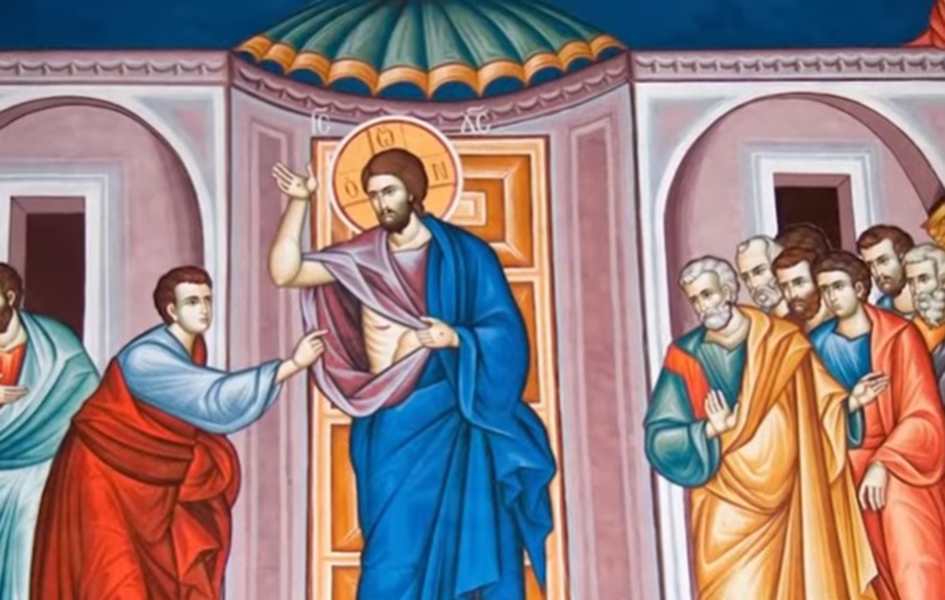“I won’t believe it until I see it…”
– that was the answer of the apostle Thomas, one of the twelve disciples of Christ, to the joyful stories of those who saw their crucified and dead Master as resurrected. And after eight days – as the Gospel says – when the disciples were together again, Christ appeared and said to Thomas: “Stretch your finger over there and see my hands; and reach out your hand and put it in my ribs, and do not be unfaithful but faithful” (Jn. 20, 27). And the apostle Thomas exclaimed: “My Lord and my God!”. And then Christ said to him: “Because you have seen me, you have believed, blessed are those who have not seen and yet have believed…” (Jn. 21, 29).
Millions of people think and speak as Thomas said, and consider such an approach to be completely correct and worthy of man: “Until I see, I will not believe…” If we were to speak in modern language, we could call this and such an approach “scientific ” approach.
Christ says: “Blessed are those who have not seen and yet have believed…” This means that there is and has always been another approach, another faith, another possibility for man. Yes, they answer us about this, but that approach is naive, irrational and, in a word, unscientific. That approach is not for us. We are modern people and that’s why we say: “Until we see, we won’t believe…”
We live in a time of great simplification and, therefore, great impoverishment. “Scientific”, “unscientific”. People repeat these words as if they were talking about something that is self-evident and understood by itself. They parrot those words because all the other people around them also parrot the same words without thinking. In fact, they blindly and simplistically believe in those words. That is why it seems to them that any other approach is frivolous and therefore does not deserve any attention. The issue is resolved. But is it really so?
I have already said that we live in a world of great impoverishment. And, indeed, if man at the end of his infinitely long development came to the attitude – “Until I see, I will not believe” and if that attitude represents the pinnacle of man’s wisdom and the greatest achievement of his reason, then our world is really a miserable, shallow and , which is the main thing, an incredibly boring world. If I only know what I see, what I can touch, measure and analyze, how little do I know! First of all, in that case, the whole world of human spirit and thinking falls away, that deeper knowledge that comes not from “seeing” or “touching”, but from “thinking” and, most importantly, “perceiving with the mind”. All that knowledge that for centuries was rooted not in external and empirical experience, but in another amazing and, indeed, inexplicable ability of man, by which man differs from everything else in the world, which makes him a truly unique being, falls away. Touch, measure, provide accurate data, and even make a prediction – we know that today – not only humans, but also robots, machines and computers.
What’s more, a computer – we know that – can measure, compare and provide incomparably more accurate and “scientific” data than a human. But, what no computer will ever and under no circumstances be capable of is to be delighted, to be amazed, to understand, to be moved, to be happy, to understand what cannot be understood by any measurement or analysis. No computer can hear those silent sounds from which music and poetry are born. No computer will ever cry over anything, or believe anything. But doesn’t our world – left without all that – then become a lifeless, boring, and – I would say – unnecessary world? Oh, yes – airplanes and spaceships will fly even further and even faster. But where and why? Oh, yes – laboratories will provide even more accurate analyses. But for what? They tell us: “For the good of mankind.” We answer them: healthy, well-fed and self-satisfied people will walk the world, but so blind and so deaf that they will no longer even be aware of their blindness and deafness.
“I won’t believe it until I see it.” But empirical experience is only one of human experiences, and – at that – the most elementary and, therefore, the lowest form of knowledge. Empirical experience is useful and necessary, but to reduce all human knowledge exclusively to empirical experience is like trying to understand the beauty of an artistic painting by chemical analysis of the colors used in the painting. And what we call faith is actually the second and higher level of human knowledge. It can be said that a person without that higher knowledge, without faith, could not live a single day. Every person believes in something and trusts someone. The only question is whose faith, whose vision and knowledge of the world is more correct, fuller and more adequate to the richness and complexity of human life.

They say: The resurrection of Christ is a fabrication, because the dead do not rise. Yes, but only if there is no God. However, if there is a God, then death must also be defeated, because God cannot be the God of decay and death. But they continue: but there is no God – He is not there, because no one has ever seen Him. But what does it mean then – we ask them – all that experience of millions of people who joyfully claim to have seen God, but not with a physical, but with an inner, deeper and more reliable vision?
Two thousand years have passed, and in response to the heavenly greeting “Christ is risen!”, the joyous greeting “He is risen indeed!” is still echoing in the world. Don’t you see, don’t you hear? In the depth of your consciousness – beyond all analyses, measurements and checks – don’t you see, don’t you feel that immortal and dazzling light, don’t you hear that eternal voice that says: “I am the Way, the Truth and the Life…”? Don’t you understand that in the depths of the soul, Christ is constantly responding to Doubting Thomas in us, in me, in you:
“Blessed are those who have not seen and yet have believed.”
Archpriest Alexander Shmeman

